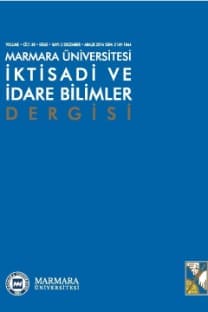Türk cumhuriyetleri’nin iktisadi kalkınma sürecinde bilgi ekonomisinin rolü ve önemi
The role and importance of knowledge economy in the economic development process of the turkish republics
___
- AKYÜZ Y., Sermaye Bölüşüm Büyüme, Ankara Üniversitesi SBF. Yay. 1977
- ATEŞ S., “Yeni İçsel Büyüme Teorileri ve Türkiye Ekonomisinin Büyüme Dinamiklerinin Analizi”, Çukurova Üniversitesi, SBE. 1998, (Yayınlanmamış Doktora Tezi)
- ATİK Hayriye, DURA Cihan, Bilgi Toplumu Bilgi Ekonomisi ve Türkiye, Literatür Yayınları, 2002
- CHEN D.H.C., DAHLMAN C.J., The Knowledge Economy, The Kam Methodology and World Bank Operations, The World Bank Washington DC 20433, October 19. 2005
- EUROPEAN COMMISSION, The Lisbon Strategy and The Information Society, European Commission. 2007
- KARGI Nihal (Edt). Bilgi Ekonomisi, Ekin Yayınevi, 2006
- KİBRİTÇİOĞLU A., "İktisadi Büyümenin Belirleyicileri ve Yeni Büyüme Modellerinde Beşeri Sermayenin Yeri" AÜ Siyasal Bilgiler Fakültesi Dergisi, Ocak-Aralık 1998, Cilt 53, No. 1-4, s. 207-230.
- OECD, The Knowledge-Based Economy, OECD, Paris. (96)102, 1996, ÖZSAĞIR Arif, Bilgi Ekonomisi, Nobel Yayın, 2007
- PORTER M.E., Competitive Advantage of Nations, Macmillian Inc., New York,USA. 1990
- SALA-I-MARTIN X., ve Diğerleri, “The Global Competitiveness Index: Prioritizing The Economic Policy Agenda” in The Global Competitiveness Report 2008–2009, Co-Directors, M. E. Porter, K. Schwab, World Economic Forum, 2008
- SARIDOĞAN E., Mikroekonomi ve Makroekonomi Seviyesinde Küresel Rekabet Gücünü Etkileyen Faktörler ve Stratejiler, İstanbul Ticaret Odası Yay. No. 2010/51-21139, 2010
- SOLAK F. SARIDOĞAN E., “Küresel İktisadi Krizin Türk Cumhuriyetleri’ne Etkileri” Marmara Üniversitesi İ.İ.B.F. Dergisi, YIL 2011, CİLT XXX, SAYI I, s.93-115
- SOLAK F., SARIDOĞAN, E., “Sürdürülebilir İktisadi Büyüme ve Küresel Rekabet Gücü Bağlamında Tekno-Girişimciliğin Rolü ve Önemi”, Üçüncü Uluslararası Girişimcilik Kongresi, 17–19 Mayıs 2011, Bişkek, Kırgızistan. 2011
- SOLOW R.M., “Technical Change And The Aggregate Production Function” The Review Of Economics And Statistics, Vol. 39, No. 3 (Aug., 1957), s. 312-320
- THE WORLD BANK, From Natural Resources to the Knowledge Economy: Trade and Job Quality. Latin America and Caribbean Region. Washington, DC. 2002b
- THE WORLD BANK, Closing the Gap in Education and Technology. Latin America and the Caribbean Region. Washington, DC. 2003
- THE WORLD BANK, “KAM 2008 Booklet: Measuring Knowledge in The World Economies” Knowledge Assessment Methodology And Knowledge Economy Index, Knowledge For Development Program. 2008
- THE WORLD BANK, “KAM 2008 Booklet: Measuring Knowledge in The World Economies” Knowledge Assessment Methodology and Knowledge Economy Index, Knowledge For Development Program. 2008
- THE WORLD BANK, “KEI and KI indexes” http://go.worldbank.org/ SDDP3I1T40, (5.5.2011)
- THE WORLD BANK, “Knowledge Assessment Methodology” Updated October 2008, http://web.worldbank.org/ wbsıte/external/wbı/ wbıprograms, 2008 (5.5.2009)
- THE WORLD BANK, Custom Scorecards (KAM 2008), http://info.worldbank .org /etools/kam2, (5.5.2009)
- THE WORLD BANK. “Innovation Systems: World Bank Support of Science and Technology Development.” World Bank Working Paper 32. Washington, DC. 2004b
- THE WORLD BANK. Building Knowledge Economies, Advanced Strategies for Development, WBI Development Studies, The International Bank for Reconstruction and Development / The World Bank Washington, DC. 2007
- THE WORLD BANK. Constructing Knowledge Societies: New Challenges for Tertiary Education, Education Group, Human Development Network. Washington, DC. 2002a
- THE WORLD BANK. Indigenous Knowledge: Local Pathways to Global Development. Africa Region, Washington, DC. 2004a
- TURANLI R., SARIDOĞAN E., Bilim-Teknoloji-İnovasyon Temelli Ekonomi ve Toplum. İstanbul: İTO yay. 2010
- YUMUŞAK, İ.G., BİLEN, M., “Türkiye Küresel Ağa Hazır Mı? Bilgi Ekonomisi İndeksi, Beşeri Kalkınma İndeksi ve Ağa Hazırlık İndeksi Göstergeleri Üzerine Bir Değerlendirme”. 8th International Congress On Knowledge, Economy & Management Program, October 28th-31st, 2010, İstanbul, Turkey
- ISSN: 1300-7262
- Yayın Aralığı: 2
- Başlangıç: 1984
- Yayıncı: Marmara Üniversitesi
Bilgi çağında değişim ve liderlik
İthal ham petrol fiyatlarının Türkiye’deki makroekonomik aktiviteler üzerindeki etkisi
Kredilendirme süreci ve basel ıı kriterleri ile karşılaştırılması
Mukadder HORASAN, İlkay HORASAN
Türkiye turizm politikasının shift-share analizi
Özge UYSAL, Mehmet ŞAHiN, Elif KURU
Türkiye’de vergi suç ve cezalarının değerlendirilmesi: Antalya ili örneği
Hüseyin Güçlü ÇiÇEK, Hatice HEREK
Finansallaşan kapitalizmin başarısızlışı
Türkiye’de çalışma hayatında kadın istihdamı
Türkiye ekonomisinde para politikasının ekonomik büyüme üzerine etkisi *
Türk cumhuriyetleri’nin iktisadi kalkınma sürecinde bilgi ekonomisinin rolü ve önemi
Bankacılık düzenlemeleri ile finansal istikrar ilişkisi: 1990 -2010 Türkiye deneyimi
